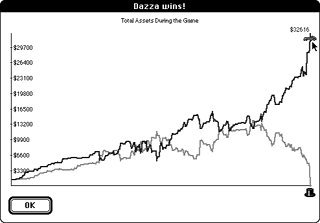I don't believe in describing art works as "great," "important," or even "fine." (Fine art is the domain of magistrates and meter maids.) For the purposes of argument, however, let's say I was kidnapped by the yakuza and taken top a nondescript house in the Nagasaki suburbs. There, massive unemployed sumo wrestlers tortured me with white-hot steel pins thrust under my fingernails until I named what I thought was the greatest, most important and finest art work of the twentieth century.
In this situation, the first and last word to come to mind would be "Monopoly." (I certainly wouldn't name any of my own pieces, being immodest is one of the most unforgivable faux pas one can make in Japan.)
I spend around an hour a day playing Monopoly with my computer. Since these games go very fast with the computer doing the accounting, an average game takes only fifteen minutes. Each game is another window into an exquisitely balanced world of probability, improbability, and chance. (As a bonus, the computer also presents a graph at the end of each game showing each player's fortunes during the course of play.)
After thousands of games, I have concluded that Monopoly has no finite boundaries.
I recently heard that scholars believe the man credited with inventing Monopoly actually plagiarized the idea from a woman who'd invented a very similar game. For me, that was the icing on the conceptual cake.

